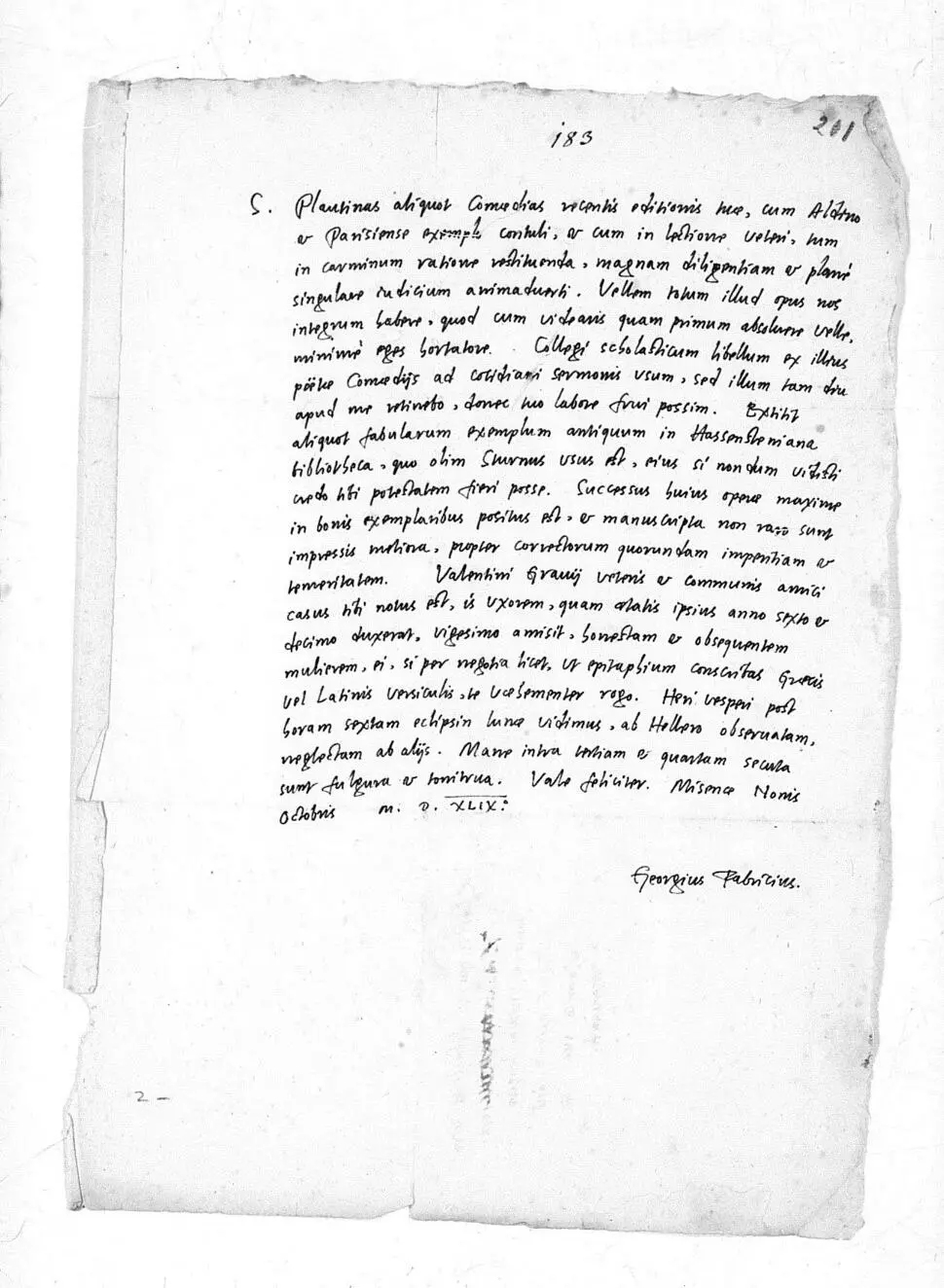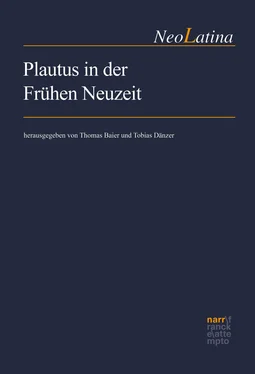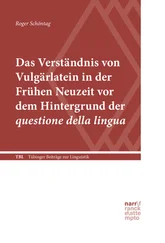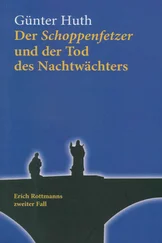1 ...8 9 10 12 13 14 ...31 Caetera sunt considerationis et curae ac studii nostri.
I got a certain amount of help from two books. They’re both old but scandalously disfigured by the idiocy and laziness of the scribes who copied them out. I got one of them from the library of Veit WerlerWerler, Veit of Franconia, who is both a scholar and a gentleman. I owe quite a few of my textual corrections to it.
Moreover, Georg FabriciusFabricius, Georg’ outstanding candor and kindness toward me, from the incredible enthusiasm of his diligence, recently shared his book with me, which he’d packed with whatever he could find out in his reading that had some bearing on emending and elucidating Plautus’ plays.
I alone am responsible for everything else in this book.
Because the 1552 text is printed as a single block, my paragraphing here is meant to clarify that CamerariusCamerarius d.Ä., Joachim is not talking about two books, but three. The first is the Vetus, but the second is not, as is sometimes thought, “Georg FabriciusFabricius, Georg’ book.” FabriciusFabricius, Georg’ book is a third book, a collection of fragments that was supposed to be reprinted in CamerariusCamerarius d.Ä., Joachim’ edition but accidentally got left out; I will come back to it in ch. 8.2 The point to grasp here is that the “two books” CamerariusCamerarius d.Ä., Joachim says he got help from are camels B and C – that is, the Vetus and the Decurtatus.
We know a lot about the origins of the Vetus because CamerariusCamerarius d.Ä., Joachim had written in greater detail about it in the preface to the 1545 partial edition of Plautus he’d published in Leipzig.3 As he explains there, once upon a time Martin PollichPollich, Martin (1455–1513), the first rector of Wittenberg University, had owned it. In 1512, PollichPollich, Martin gave it Veit WerlerWerler, Veit, CamerariusCamerarius d.Ä., Joachim’ former professor at Leipzig mentioned above, and in 1525 the humanist Michael RotingRoting, Michael (1494–1588), WerlerWerler, Veit’s nephew, took it from WerlerWerler, Veit’s bookcase and gave it to CamerariusCamerarius d.Ä., Joachim. By 1552, therefore, when CamerariusCamerarius d.Ä., Joachim published his complete Plautus in Basel, he had had the manuscript in his possession for 27 years.4
The situation with the Decurtatus is entirely different. CamerariusCamerarius d.Ä., Joachim claims he got “help” ( adminicula ) from both manuscripts, but his claim does not match the evidence. As Ritschl puts it,
A glance at any page of my edition of Bacchides Bacchides or at the notes in TaubmannTaubmann, Friedrich, GruterGruter, Jan, and PareusPareus, Johann Philipp on any scene at all in any one of Plautus’ twenty comedies can show that CamerariusCamerarius d.Ä., Joachim didn’t mention 1 % of its manuscript variants.
The editor of Ritschl’s Kleine Schriften interjects, “No kidding – not even 0.1%!”5
Equally strange is where and when CamerariusCamerarius d.Ä., Joachim got the Decurtatus in the first place. Thanks to a subscription written on its first page, we know that the manuscript had once belonged to the library of the St. Corbinian abbey at Freising (Bavaria). But CamerariusCamerarius d.Ä., Joachim does not say that or anything else about how it came into his possession. In his facsimile edition of the Decurtatus, Zangemeister complained,
I’ve completely failed to find out by what rights CamerariusCamerarius d.Ä., Joachim called this “his” manuscript or what year he got it in, though it is clear that this [1545 prefatory] letter is his first mention of it. He chose to say nothing of its origins.6
A few years ago, Giorgia Bandini echoed him: “We cannot know how and when, once he had also gotten hold of C, CamerariusCamerarius d.Ä., Joachim compared the two manuscripts.” We have thus made no progress since Ritschl, who wrote in 1848 “By what vicissitudes it reached CamerariusCamerarius d.Ä., Joachim, is unknown,” and who ended an essay shortly before his death, “Anyone who can shed light on this mystery will be most appreciated . ”7
I’m pleased to say the first letter I found in 2017 might finally shed light on this mystery.
5. FabriciusFabricius, Georg’ Letter of 1549

FabriciusFabricius, Georg’ 1549 letter to CamerariusCamerarius d.Ä., Joachim (Bayerische Staatsbibliothek München, Clm 10431(1, Nr. 183 (fol. 201r))
In the Bavarian State Library in Munich there is a random collection of manuscript letters to CamerariusCamerarius d.Ä., Joachim and others from various scholars.1 Among them is one about editing Plautus from the humanist Georg FabriciusFabricius, Georg of Chemnitz (1516–1571). This is the same FabriciusFabricius, Georg that CamerariusCamerarius d.Ä., Joachim thanks in the 1552 preface (the two corresponded frequently over the years). FabriciusFabricius, Georg sent the letter on October 7, 1549, when he was rector of the Saint Afra school in Meißen (Saxony). The first two thirds are of great interest for the history of Plautine scholarship:
Plautinas aliquot comoedias recentis editionis tuae, cum Aldino et Parisiense exemplo contuli, et cum in lectione veteri, tum in carminum ratione restituenda, magnam diligentiam et planè singulare iudicium animadverti. Vellem totum illud opus nos integrum habere, quod cum videaris quam primum absolvere velle, minime eges hortatore.
Collegi scholasticum libellum ex illius poetae comoediis ad cotidiani sermonis usum, sed illum tam diu apud me retinebo, donec tuo labore frui possim.
Extitit aliquot fabularum exemplum antiquum in Hassensteniana bibliotheca, quo olim Sturnus usus est, eius si nondum vidisti credo tibi potestatem fieri posse. Successus huius operae maxime in bonis exemplaribus positus est, et manuscripta non raro sunt impressis meliora, propter correctorum quorundam imperitiam et temeritatem.
I compared the text of some of Plautus’ comedies in your new edition [ sc . of 1549; ch. 7 below] to those in the Aldine and Paris editions. The pains you took and the good judgment you exercised were obvious in both the critical text and in fixing the meter of the polymetric cantica. I wish we had the complete edition! But since you seem eager to finish it off as soon as you can, you certainly don’t need me to cheer you on.
I’ve finished assembling a textbook of extracts from the comedies of Plautus to teach students how to speak everyday Latin, but I’m going to hang on to it until I can have you take a look at it.2
There is an ancient copy of some plays in HassensteinHassenstein, Bohuslaus von’s library; Sturnus used it once. If you haven’t seen it yet, I believe you can get access to it. The success of this effort rests mostly on using good model texts, and manuscripts are often better than printed books, because of the inexperience and thoughtlessness of certain “correctors.”
My heart skipped a beat when I came across this letter; I assumed the third paragraph describes a new, unknown, and ancient manuscript of Plautus, still sitting unexploited on some shelf in “HassensteinHassenstein, Bohuslaus von’s library.” Upon investigation, I have concluded the manuscript described must be one of CamerariusCamerarius d.Ä., Joachim’ two camels, probably the Decurtatus. My case is only circumstantial, but if I’m right, then the mystery of that manuscript’s origin is partially solved. Here is my reasoning.
“HassensteinHassenstein, Bohuslaus von’s library” refers to the Lobkowicz Library, a private library still in existence 35 km north of Prague. It was founded by the Bohemian aristocrat and humanist Bohuslaus von HassensteinHassenstein, Bohuslaus von (1461–1510) in Hasištejn castle, near Meißen and Chemnitz, where FabriciusFabricius, Georg lived, and not far from Leipzig. In his time, HassensteinHassenstein, Bohuslaus von amassed a huge library of more than 650 volumes. The library still possesses many of its manuscripts but it does not have one of Plautus, and has not since before 1520.1 According to Kamil Boldan, the Plautus manuscript “must have been taken away in the first years after Bohuslav’s death (1510) because the catalogue of the HassensteinHassenstein, Bohuslaus von library, which dates back to 1520, no longer lists it.”2 As I will explain, FabriciusFabricius, Georg’ 1549 statement affirming its existence in the library must, therefore, be based on out-of-date hearsay and memory, not autopsy, and it arouses the suspicion that FabriciusFabricius, Georg could be referring to the Vetus. I would like to raise that possibility only to dismiss it.
Читать дальше













